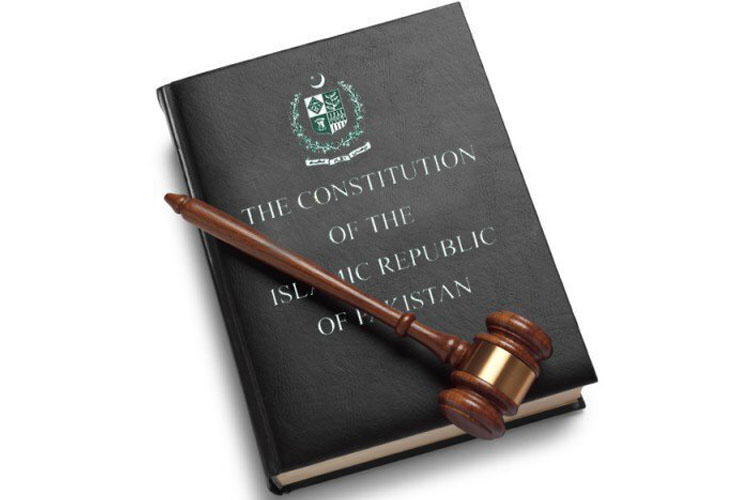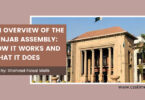Pakistan’s 1973 constitution is, indeed, the most sacred one of all other documents that the lawmakers of this country have ever penned or will pen down. But it is to say with great pain and anguish that this sacred document has been violated many a time by military dictators and civilian leaders alike. While dictators overrode it by abrogating or subverting or suspending it, civilian leaders being unable to implement its provisions also damaged its sanctity. As a result, the likes of Musharaf took courage to call it a piece of paper.
Among other characteristics that the constitution of Pakistan has, Article 25 makes everyone equal before the law and emphasises on indiscriminate treatment. And Article 10 A, included through the 18th Amendment, ensures that the state deprives no one of the due process of law in the civil and criminal matters. The constitution obliges the state to protect these rights of the people, which constitute its Fundamental Rights chapter. However, Article 5 obligates the citizens to obey the law of the land and the constitution itself. And Article 6 is the protection wall to discourage any kind of adventurism against the constitution. However, the intent of the Article aforementioned does end with protecting the basic law. It also seeks to discourage those who want to roll the democratic process back.
Hopefully, the explainer will help people in avoiding knee jerk reaction to the verdict against General (retired) Pervaiz Musharaf. The verdict of the special court against the dictator for imposing emergency in November 2007 has created a political crisis. The situation is embarrassing for the PTI government and some in the establishment. Nevertheless, it is not the first time that Musharaf’s action has been seen as the equivalent of abrogation of the constitution. Iftikhar Muhammad Chaudhry, the then Chief Justice of Pakistan led bench pronounced that the dictator’s action was tantamount to abrogation of the Constitution in one of its judgments (PLD 2009 SC 879). What was beyond comprehension was the knee jerk reaction of the military spokesperson who right after the short order criticised the court’s decision. Was the reply justified at all? In countries where the jurisdiction of institutions is neatly defined, no one would dare so. But this is Pakistan.
Paragraph 66 that Justice Waqar Ahmad Seth wrote, Chief Justice of the Peshawar High Court, however, created an impression that the Special Court was biased in its judgement. This para is against the spirit of civilisation, decency, fundamental rights, and more importantly, against the primary teaching of Islam. Islam prohibits disrespecting and mutilation of the dead body. The language used in the para 66 is not befitting of a Justice of a High Court. The words used in that para suggest that emotions had replaced reason. Whatever the merits of this judgment are this infamous para has overshadowed all the proceedings and provided fuel to the critics. And that gave a chance to Musharaf’s sympathisers to discredit the whole judgement.
The ruling given by Justice Waqar has infuriated people. The strong reaction against disrespecting rights is not wrong. Fortunately, Mr Shahid Karim another member of the Special Court, who agreed with the conviction, however, in his own note objected to the said para. He rightly maintained that neither the law nor the constitution allows for such punishment, and it is ultra vires. The exact words of Mr Shahid Karim read, “As stated above, I dissent with the President on the further sentence in paragraph 63 [66] of the judgment sought to be imposed on the accused upon conviction. It has no basis in law and will be ultra vires for this Court to do so. In my opinion, it is enough to sentence the accused to death…”
Nevertheless, claims that institutions respect their limitations and do not object to each others working suddenly vanished with the DG ISPR’s press release right after the court’s short order. That the short order caused anger, pain and anguish among the army’s rank means that the institution and its members think of themselves above the law. The military could have succeeded more support after the detailed judgment had it not reacted to the short order. At the moment, while many criticise the phrasing of para 66, the military should not think of criticism as a sudden change in people’s opinion. The public opinion is still sharply divided over the matter.
The judgement against Musharraf has added to the problems of the government. The government is already struggling to fight a Presidential Reference against Justice Qazi Faez Isa and a 10-Member Bench is seized with this case in the Supreme Court of Pakistan. It would more difficult to file another reference. As if all such happenings were not enough, the PM’s words and actions contradict each other. For instance, some time ago, he said that the courts should treat the rich and poor equally. Now his government is going against the Special Court’s decision. Will doing so not contradict our PM’s words? It is true that the PM will find it difficult to act according to his words. However, if the government allows the court to implement the law in letter and spirit, it will strengthen democracy.
Otherwise, we have to make ourselves content with sham democracy in the country. It is important for all the stakeholders to believe in the institutions. Especially, they need to have faith in the superior courts. The institutions must trust the wisdom and sense of justice of the superior courts. The judge of the special court by drafting Para 66 has already given the opportunity to those who feel anger, pain and anguish. But it will depend on the deftness of the legal team of Musharraf to get him out from the claws of the law. Lastly, one point that needs reiteration is that our polity runs through a written constitution. Therefore, every organ of the state and every department must work within the limits that the basic law of the land outlines for them. That no one is above the law is the only law. The sooner we understand and internalise this the better it will be for the prosperity of this country.
Muhammad Imran
The author is a staff member of SAHSOL LUMS and holds an LLM degree from the University of Lahore.
Courtesy: Daily Nation








very informative